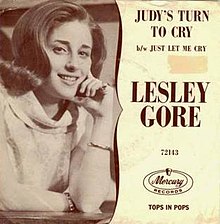
Lesley Sue Goldstein, better known with her maternal surname as Lesley Gore, was an American singer and songwriter. At the age of 16, she recorded her first hit song "It's My Party", a US number one in 1963. She followed it up with ten further US Billboard top 40 hits including "Judy's Turn to Cry" and "You Don't Own Me". Gore said she considered "You Don't Own Me" her signature song.

"Misty" is a jazz standard written and originally recorded in 1954 by pianist Erroll Garner. He composed it as an instrumental in the traditional 32-bar format, and recorded it on July 27, 1954 for the album Contrasts. Lyrics were added later by Johnny Burke. It appeared on Johnny Mathis' 1959 album Heavenly, and this recording reached number 12 on the U.S. Pop Singles chart later that year. It has since become Mathis’ signature song.
An answer song, response song or answer record is a song made in answer to a previous song, normally by another artist. The concept became widespread in blues and R&B recorded music in the 1930s to the 1950s. Answer songs were also popular in country music in the 1950s, 1960s, and 1970s, sometimes as female responses to an original hit by a male artist or male responses to a hit by a female artist.

"Life Is a Rock (But the Radio Rolled Me)" is a 1974 patter song written by Norman Dolph (lyrics) and Paul DiFranco (music). It was recorded by an ad hoc group of studio musicians called Reunion, with Joey Levine as lead singer. The lyrics are a fast patter recitation of the names of 1950s,1960s, and 1970s disc jockeys, musicians, songwriters, record labels, song titles and lyrics, broken only by the chorus, similar to the way the song "I've Been Everywhere" listed place names. Levine had previously been lead singer and co-writer of bubblegum music hits "Yummy Yummy Yummy" and "Chewy Chewy" by the Ohio Express. "Life Is a Rock" peaked at No. 8 on the Billboard Hot 100 chart and reached No. 33 on the UK Singles Chart.
"Turn! Turn! Turn!", also known as or subtitled "To Everything There Is a Season", is a song written by Pete Seeger in 1959. The lyrics – except for the title, which is repeated throughout the song, and the final two lines – consist of the first eight verses of the third chapter of the biblical Book of Ecclesiastes. The song was originally released in 1962 as "To Everything There Is a Season" on the folk group the Limeliters' album Folk Matinee, and then some months later on Seeger's own The Bitter and the Sweet.

Claus Ogerman was a German arranger, conductor, and composer best known for his work with Billie Holiday, Antonio Carlos Jobim, Frank Sinatra, Bill Evans, Michael Brecker, and Diana Krall.

"It's My Party" is a song by American singer Lesley Gore from her debut studio album I'll Cry If I Want To (1963). It was released as the lead single from the album on April 5, 1963, by Mercury Records. The song was collectively written by Herb Wiener, John Gluck Jr., and Wally Gold, while production was helmed by Quincy Jones.
"What Kind of Fool Am I?" is a popular song written by Leslie Bricusse and Anthony Newley and published in 1962. It was introduced by Anthony Newley in the musical Stop the World – I Want to Get Off. It comes at the end of Act Two to close the show. Bricusse and Newley received the 1961 Ivor Novello award for Best Song Musically and Lyrically. At the 1963 Grammy Awards, it won the award for Song of the Year and was the first by Britons to do so.
"The Party's Over" is a popular song composed by Jule Styne with lyrics by Betty Comden and Adolph Green. It was introduced in the 1956 musical comedy play Bells Are Ringing by Judy Holliday. For the movie version (1960), Judy Holliday again performed the song.

"You Don't Own Me" is a pop song written by Philadelphia songwriters John Madara and David White, and was recorded by Lesley Gore in 1963, when she was 17 years old. The song was Gore's second most successful recording and her last top-ten single. Gore herself considered it to be her signature song claiming “I just can’t find anything stronger to be honest with you, it’s a song that just grows every time you do it.”

"So You Want to Be a Rock 'n' Roll Star" is a song by the American rock band the Byrds. Written by Jim McGuinn and Chris Hillman, it was included on the band's 1967 album, Younger Than Yesterday. The song was inspired by the manufactured nature of the Monkees and was released as a single on January 9, 1967, reaching number 29 on the Billboard Hot 100, but failing to chart in the United Kingdom.

"Guess Things Happen That Way" is a 1958 cross over single by Johnny Cash, which was written by Jack Clement. The single was Johnny Cash's fourth #1 on the country chart spending eight weeks at #1, and a total of 24 weeks on the chart.

I'll Cry If I Want To is the debut album of Lesley Gore. The album included her hit singles "It's My Party" and its follow-up, "Judy's Turn to Cry". The album was rushed out after "It's My Party" became a big hit, and the songs are mostly about crying, linking to the hit single's first line "It's my party and I'll cry if I want to", incorporating songs with titles such as "Cry", "Just Let Me Cry" and "Cry and You Cry Alone". Besides the hit singles, the album included pop standards such as "Misty", "Cry Me a River" and "What Kind of Fool Am I?". The album reached number 24 on the US Billboard 200. Edsel Records released the album on Compact Disc in 2000 in combination with Gore's second album, Lesley Gore Sings of Mixed-Up Hearts. The album was named the 181st best album of the 1960s by Pitchfork.

"She's a Fool" is a song written by Mark Barkan and Ben Raleigh that was originally recorded by Lesley Gore in 1963; it appeared as a single and on the album Lesley Gore Sings of Mixed-Up Hearts. Quincy Jones was the producer.
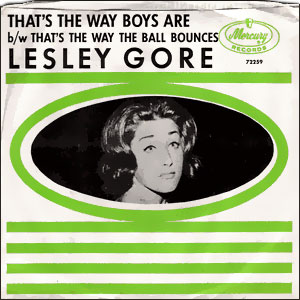
"That's the Way Boys Are" is a song written by Mark Barkan and Ben Raleigh, first recorded by Lesley Gore and released in March 1964 – her fifth hit single, following four consecutive top five hits on Billboard's Hot 100. In late April 1964, with the British Invasion in full swing, "That's the Way Boys Are" peaked at No. 12 on the Hot 100; hits by UK acts The Beatles and The Dave Clark Five accounted for five of the singles in the Top Ten. The track was produced by Quincy Jones and arranged by Claus Ogerman and features on Gore's third album, Boys, Boys, Boys.
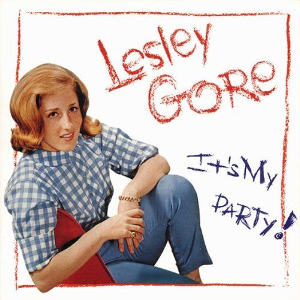
Lesley Gore: It's My Party is a five disc box set from Bear Family Records released June 21, 1994, that includes every Mercury Records release by Gore between 1963 and 1969. It also includes foreign language versions and never-released songs.

Lesley Gore Sings of Mixed-Up Hearts, also known as Sings of Mixed-Up Hearts, is the second studio album by Lesley Gore. It was released in 1963 as the follow-up to her debut album I'll Cry If I Want To.
Beverly Ross was an American singer-songwriter and musician who co-wrote several successful pop songs in the 1950s and 1960s, including "Dim, Dim The Lights", "Lollipop", "The Girl of My Best Friend", "Remember Then", and "Judy's Turn to Cry".
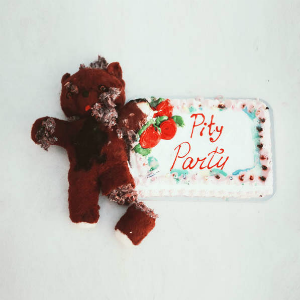
"Pity Party" is a song by American recording artist Melanie Martinez based on the 1963 Lesley Gore hit "It's My Party". It was released as the lead single from her debut album, Cry Baby (2015), on June 2, 2015. The music video was released on June 1, 2015. It impacted contemporary hit radio on March 22, 2016.
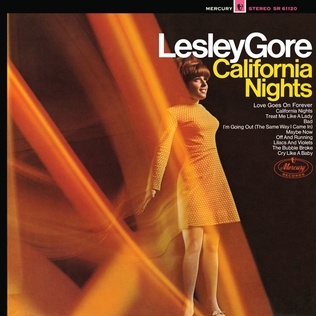
California Nights is a 1967 album by Lesley Gore, the last of her seven albums released on the Mercury Records label. The title track on the album, California Nights, peaked at #16 and was Gore's last Top 20 hit. Bob Crewe produced seven of the tracks on the album, while Quincy Jones produced three. The album was reissued in 2015 as part of a compilation in both album and CD format by Ace Records, which included 15 bonus tracks from her Mercury catalogue.
